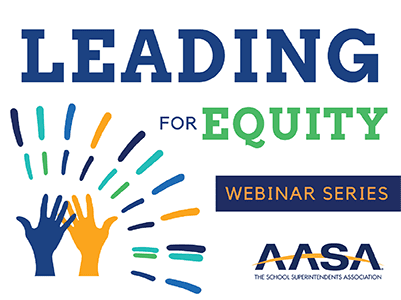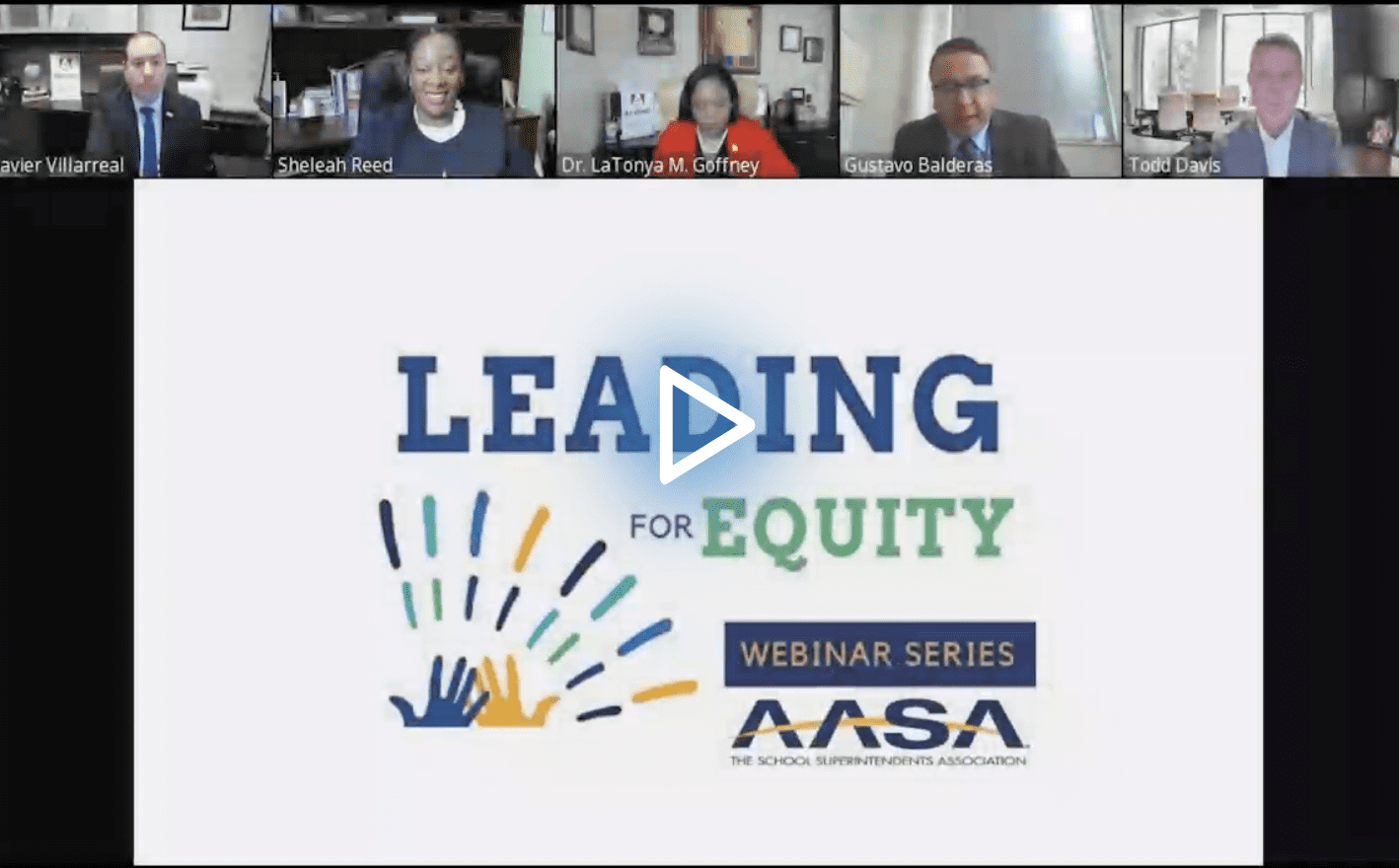Transforming a School District’s Leadership and Literacy Instruction to Increase Equity
When only 28% of a school district’s third graders are reading at grade level, changes are clearly needed. In the Aldine Independent School District just outside of Houston, Texas, the need for change resulted in a dual focus on improving the district’s leadership bench and revamping literacy instruction, in order to provide an equitable education for all students.
The district’s transformation process was recently discussed during an edWebinar, hosted by AASA, The School Superintendents Association and AASA’s Leadership Network. The presentation featured Dr. LaTonya Goffney, Aldine ISD’s Superintendent; Dr. Todd Davis, Chief Academic Officer; Dr. Javier Villarreal, Chief Human Resources Officer; and Sheleah D. Reed, Chief Communications Officer.
Dr. Goffney cited her personal experiences growing up in poverty and being raised by her grandparents as an important perspective on the lives of many of the district’s current students, noting reading books helped to bolster her while going through the trauma children in poverty often experience. She quoted her grandfather, who only had a third-grade education, but said, “If you can read, you can go anywhere.”
Transforming Leadership
Currently, 88% of Aldine’s 67,000 students are considered economically disadvantaged. Almost 75% of the students are Hispanic, and just over 20% are African American. More than one-third of the students are English learners, and many of their parents have limited English proficiency.
After becoming Superintendent, Dr. Goffney did a learning-and-listening tour of the district and spent additional time surveying staff members. What she found was there was no clear definition of success, and a number of people with high-level titles were not leading at the appropriate levels while other staff members were leading without a title or permission.
To respond, Aldine developed a leadership plan that included a clear definition of what leadership is in Aldine. It centers on three keywords—connect, inspire and impact. Leadership in Aldine now specifically includes cultivating relationships through empathy and cultural awareness, recognizing potential by identifying areas of strength and working to build capacity, and making student-driven decisions supported by relevant data.
To clarify expectations, the district leadership definition is integrated into job descriptions, interviews, and departmental improvement plans. The district’s strategic plan—a new way forward—has made developing leadership at all levels a priority including creating a district leadership development program targeting assistant principals. Other key aspects of the strategic plan include improving student achievement, school culture, organizational efficiency, and family and community engagement.
Transforming Literacy Instruction
After a curriculum audit and a second opinion confirmed the resources being used were not well aligned with the level of text on state tests, there was also a program evaluation that showed disparities in literacy instruction, with some educators not always providing the level of instruction students needed.
These findings led to “deep work” on transforming literacy practices, including monthly collective learning sessions led by Dr. Davis in which educators had opportunities to study and talk in a safe environment. A decision was made to abandon the previous curriculum and change course, and the district developed a new vision for academically rigorous and culturally relevant literacy instruction, which is designed to develop analytical readers, skillful writers, and effective communicators.
The four key aspects of the new literacy program start with a systematic approach to teaching foundational skills based on the science of reading. This includes developing phonological and phonemic awareness, phonics skills, word recognition, and concepts about print. Students are also exposed to challenging and meaningful complex text every day and participate in knowledge building that deepens their understanding of the world.
High-quality instructional materials are now in the hands of every teacher and student, and the district is focused on making sure every child has equal access to learning opportunities with a skillful teacher every day. There is also a systematic approach to identifying needs and providing services that can fill gaps in students’ learning and accelerate progress.
Aldine’s literacy instruction now has a coherent framework and clarity of expectations that is building confidence and capacity among the staff, while providing opportunities and choices for students. The first year of the new program coincided with the pandemic, but significant progress has been made and a continuous improvement of the program is ongoing.
The implementation of the new literacy program also coincided with the death of George Floyd, and during a conversation with African American school leaders, Dr. Goffney was told about a 10th grader who was frequently acting out and starting to have run-ins with the police. A review of his file revealed he was still reading at a third-grade level, but there is now hope that getting young men reading on grade level and engaged in school will decrease these types of outcomes and provide more opportunities for success instead.
This edWeb broadcast was hosted by AASA, The School Superintendents Association and AASA’s Leadership Network, providing premier professional learning for educational leaders.
Watch the Recording Listen to the Podcast
About the Presenters
Dr. LaTonya M. Goffney serves as the superintendent of schools for the Aldine Independent School District. Since taking the helm in July 2018, Dr. Goffney has dedicated herself to nearly 67,000 students and more than 9,000 employees of the district as well as the entire Aldine community. She has increased student achievement in every district she’s served in by focusing on early childhood education, literacy, targeted professional development for teachers, and collaboration across the community, including developing business and school partnerships, parent engagement, and communication.
In recognition of her efforts, Dr. Goffney has received numerous awards and honors, including being named Superintendent of the Year by the Texas Association of School Boards in 2017 and the Texas Association of School Administrators nominee for the 2018 American Association of School Administrators National Superintendent of the Year award.
A native of Coldspring, Texas, Dr. Goffney is a graduate of Sam Houston State University. She earned her bachelor’s degree in history, a master’s in educational administration, and a doctorate in educational leadership. She served as Superintendent of Schools for both Coldspring-Oakhurst CISD and Lufkin ISD before becoming Superintendent of Aldine ISD.
Dr. Javier Villarreal was announced as the district’s new Chief Human Resources Officer in November 2018. Dr. Villarreal brings 22 years of educational experience to Aldine.
Prior to coming to Aldine, Dr. Villarreal served Fort Bend ISD as the assistant superintendent of school leadership. Dr. Villarreal has also served as an adjunct professor at the University of Houston, as the principal of Edison Middle School and DeZavala Elementary School in Houston ISD, and as an assistant principal at Ortiz Middle School in HISD. He began his educational career as a first-, second-, and fourth-grade teacher at Franklin Elementary School and Wilson Elementary School. Dr. Villarreal earned his bachelor’s degree in psychology at the University of Houston, his master’s degree in education from the University of St. Thomas and his doctorate of education from the University of Houston.
Dr. Todd Davis was named Chief Academic Officer in May of 2019. Dr. Davis has devoted all of his 28 years in education to Aldine ISD and has served in a variety of capacities. As CAO, he will be responsible for providing leadership in planning, developing, maintaining and evaluating all of the district’s curriculum and instruction. With oversight over several departments, he will provide direct supervision of curriculum staff and guide instructional development.
Sheleah D. Reed, APR heads the Communications Office at Aldine Independent School District where she is responsible for providing leadership, vision, direction and execution of major district communication programs, strategies, events and activities.
Sheleah holds a bachelor’s degree in communications from Prairie View A&M University and master’s degree in journalism and public relations from Texas Christian University. She is also an Accredited Public Relations practitioner.
The native Houstonian is active in professional and civic organizations including the Texas School Public Relations Association (TSPRA). Sheleah, a public education advocate, is a Leadership ISD Harris County Fellow (Class 2018).
About the Moderator
Dr. Gustavo Balderas began his life as the child of migrant farmworkers in Eastern Oregon and developed his love of learning and passion for education in Oregon Public Schools, from kindergarten through his doctoral degree in educational leadership at the University of Oregon.
Dr. Balderas has been an educator for 30 years. He started his career in education as a high school teacher and counselor in the Hillsboro School District after teaching briefly in Texas. He moved on to elementary and middle school administrative roles and then served as an area director overseeing a cluster of K-12 schools and coordinating district curricula, as well as serving as an assistant superintendent of support services, also all in the Hillsboro School District. He served as Superintendent in California and Oregon prior to beginning his tenure.
His career highlights include improving equity and culture proficiency in the state’s K-12 instruction through the Oregon Leadership Network and the Oregon State Action for Educational Leadership Project, and developing equal access and opportunity to instruction and equity systems around student behavior and hiring practices in the districts where he has worked. Dr. Balderas was appointed to serve on the Oregon State Board of Education in 2018.
Being engaged with the community is important to Dr. Balderas, and he has served on several local and state educational and civic boards to develop and grow community partnerships. In addition to serving on the Oregon State Board of Education, he was a board member of the Oregon Department of Education English Learner Advisory Group, Connected Lane County and Early Learning Alliance. Dr. Balderas is also a volunteer consulting superintendent for the Education Research and Development Institute and the Suburban School Superintendents national organizations. He is a founding member and past president of the Oregon Association of Latino Administrators. He currently serves as NW Regional Representative and Treasurer for the National Association of Latino Administrators and Superintendents.
Dr. Balderas was named the Oregon Distinguished Latinx Educator of the Year, The Oregon Superintendent of the Year, and the AASA National Superintendent of the Year.
Join the Community
Leading for Equity is a free professional learning community on edWeb.net for school and district leaders who face many challenges leading schools and driving school improvement for all students, especially now with COVID-19.
The AASA Leadership Network drives superintendent success, innovation, and growth, shaping the future of public education while preparing students for what’s next. We are the largest, most diverse network of superintendents in America. Passionate and committed, we connect educational leaders to the professional learning, leadership development, relationships, and partnerships they need to ensure a long career of impact.
The summary of this presentation was written by Robert Low.
Robert Low has more than 30 years of educational publishing experience, ranging from editing and product management to online advertising and content development. He also works with edWeb.net to write articles on their professional learning edWebinars.






Comments are closed.